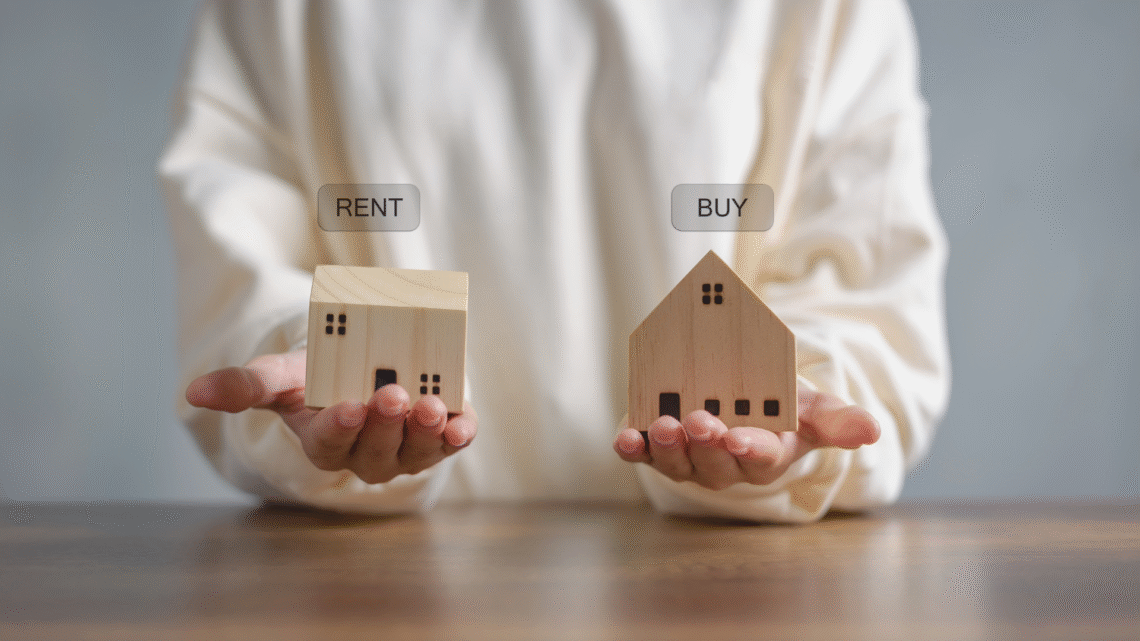
The Pros and Cons of Renting vs Buying Property
Deciding between renting and buying property presents a significant choice for many individuals. Each option carries its own advantages and drawbacks, which can greatly affect one’s financial stability and lifestyle. Understanding the key pros and cons can help individuals make informed decisions that align with their personal circumstances.
Renting offers flexibility and lower initial costs, making it an attractive choice for those who may need to relocate often or prefer not to commit to a long-term investment. On the other hand, purchasing a property can provide stability and the potential for long-term financial growth, as it builds equity over time. Evaluating personal priorities is essential to determine which path is most suitable.
Ultimately, the decision hinges on factors such as financial readiness, lifestyle preferences, and market conditions. While renting might suit transient lifestyles, buying could be more beneficial for those seeking permanence and investment potential. Understanding these elements will guide individuals towards the best choice for their needs.
Key Differences Between Renting And Buying Property
Renting and buying property each have distinct characteristics that appeal to different needs. Key differences revolve around ownership, commitment duration, and financial responsibilities.
Ownership And Control
Ownership means holding the legal rights to a property. So, when buyers purchase new homes Park City Utah (or elsewhere), they gain full control over them, allowing for modifications as desired. This can include renovations, landscaping, and upgrades, all without needing approval from a landlord.
In contrast, renting provides the tenant with a place to live without ownership rights. Renters must adhere to lease agreements, limiting their ability to alter the property. This lack of control can be frustrating for individuals who wish to personalise their living space. Additionally, once the lease ends, the tenant must vacate, further diminishing their sense of control.
Long-Term Versus Short-Term Commitment
Buying a property typically involves a long-term commitment. Homeowners generally stay in one place for several years, which helps build equity. Such stability can be beneficial for families or those seeking to establish roots in a community. When buyers commit to Stonefield homes or similar properties elsewhere, they often gain access to well-planned neighborhoods, newer infrastructure, and builder warranties that further support long-term value and peace of mind.
Renting, however, offers flexibility. With short-term leases, tenants can move more easily, making it ideal for individuals with changing job locations or lifestyles. This flexibility allows renters to explore various neighbourhoods without the pressures of a long-term commitment, although it may come with less stability in housing costs.
Financial Outlay And Commitments
Financial commitments differ significantly between renting and buying. Purchasing a property entails upfront costs such as deposits, legal fees, and ongoing expenses like mortgage payments, insurance, and property taxes. The long-term financial investment can lead to wealth accumulation through property value appreciation.
Renting involves a lower initial financial outlay, usually limited to a deposit and first month’s rent. However, rental payments do not contribute to asset ownership. Renters face the risk of rising rents and may need to relocate if they cannot meet increasing costs. This ongoing expense can discourage savings and wealth building compared to homeownership.
Advantages And Disadvantages Of Renting
Renting offers a unique set of benefits and drawbacks that can greatly influence a person’s living situation. The key considerations include flexibility, cost implications, and the lack of investment gains.
Flexibility And Mobility
Renting provides significant flexibility that appeals to many. Tenants can often choose lease agreements ranging from a few months to several years. This allows for easy relocation in response to job changes, family needs, or personal preferences.
Moreover, renting eliminates the long-term commitment associated with buying a property. This flexibility can be particularly beneficial for younger individuals or those in transitional life stages.
Renters can also explore different neighbourhoods without the burden of long-term financial ties. This adaptability is crucial for those who value mobility and wish to experience varied living situations.
Lower Upfront And Maintenance Costs
One of the most appealing aspects of renting is the lower upfront costs compared to purchasing. Typically, renters only need to pay a security deposit and the first month’s rent to move in. There are no large down payments or closing costs required.
Additionally, landlords are usually responsible for maintenance and repairs. This alleviates both the financial burden and stress from tenants, who can simply report issues without worrying about the expenses.
Monthly rent remains predictable, allowing for better budgeting. Renters benefit from avoiding unexpected costs associated with home ownership, such as property taxes and major repairs.
Lack Of Equity And Investment
A significant drawback of renting is the lack of equity accumulation. Monthly rent payments go to the landlord, meaning there is no return on investment for the tenant. This can be a financial disadvantage over time, as owners build equity in their properties.
Moreover, renters miss out on potential property appreciation, which can contribute to wealth building. While renting offers immediate housing solutions, it may not provide long-term financial benefits.
Tenants may also face rent increases, which can impact overall affordability. This uncertainty can make long-term financial planning more challenging for those who do not own their home.
Advantages And Disadvantages Of Buying
Buying property presents various benefits and challenges. Key aspects include building equity, stability, tax responsibilities, and flexibility in living arrangements.
Building Equity And Long-Term Investment
Purchasing a home allows individuals to build equity over time. As the mortgage is paid down, ownership increases, creating potential wealth. This equity can become a financial asset that appreciates as property values rise.
Additionally, homeowners can benefit from capital gains when selling, which may exceed initial investments. Making improvements can also enhance property value.
In contrast, renters do not build equity, and their monthly payments do not contribute to ownership. This financial distinction often influences the decision between renting and buying.
Recognizing these benefits, today’s housing market offers a wide range of homes to suit different budgets, lifestyles, and long-term goals. From modern condos to spacious family residences, buyers can easily explore options through online real estate platforms.
For example, prospective buyers can search online for “homes for sale in northern illinois” (or any preferred locations) to access current listings, neighborhood details, and market insights that support informed decision-making.
Stability And Security
Owning a home provides a sense of stability and security. Homeowners typically have fixed mortgage payments, which shield them from rent increases that renters may face.
In addition, owning a property allows for personalisation of the living space without restrictions often imposed by landlords. This freedom can lead to a more satisfying living environment.
However, the responsibility of maintaining property falls solely on the homeowner. Homeownership also entails longer-term commitments compared to renting, making it a significant decision for many.
Responsibility For Property Taxes And Maintenance
Buyers are responsible for property taxes and upkeep costs. Property taxes vary by location and can impact overall affordability. Yearly tax bills will need to be factored into monthly budgets.
Maintenance duties range from minor repairs to significant renovations, depending on the property’s condition. Homeowners must be prepared for these ongoing expenses, which can be unpredictable.
While renters avoid these responsibilities, they may encounter limits on personalisation and modifications to their living space. This difference often influences the decision-making process regarding property ownership.
Reduced Flexibility
Buying a property can lead to reduced flexibility compared to renting. Homeowners may find it more challenging to relocate quickly due to job changes or personal circumstances.
Selling a home takes time and effort, potentially leading to financial loss if the market fluctuates. The need to adhere to mortgage commitments further ties individuals to specific locations.
In contrast, renters can typically move with short notice, providing greater adaptability for lifestyle changes. This flexibility is a notable consideration when deciding between renting and buying.
How To Decide Between Renting And Buying
Making the choice between renting and buying property involves assessing personal circumstances, finances, and the housing market. It’s essential to analyse individual lifestyle preferences, financial situations, and current market conditions to arrive at the best decision.
Evaluating Lifestyle Needs
Assessing lifestyle needs is crucial when choosing between renting and buying. Factors such as job stability, family requirements, and personal preferences must be considered.
For instance, he or she should evaluate how long they plan to stay in a location. Renting may be more suitable for those who relocate frequently for work. Conversely, stable lifestyles with long-term plans might favour homeownership. Those opting for new builds can face the choice of working with a builder instead of a real estate agent to simplify the purchase process and gain direct access to customization options. Understanding this alternative can be an important step for homebuyers to control the negotiation process, personalize their chosen floor plan, and features that can align with their financial and lifestyle goals.
Additionally, proximity to amenities such as schools, parks, and transport links can influence the decision.
Financial Considerations And Budgeting
Financial aspects play a significant role in the choice between renting and buying. He or she needs to review their current financial situation comprehensively.
Key considerations include the savings available for a deposit, monthly rent versus mortgage payments, and potential home maintenance costs.
For a straightforward comparison, consider a simple table:
| Cost Type | Renting | Buying |
| Monthly Payment | Variable (can increase) | Fixed (generally) |
| Initial Costs | Security deposit | Deposit & fees |
| Maintenance Costs | Landlord’s responsibility | Owner’s responsibility |
Understanding these costs can help in budgeting. He or she should also evaluate whether long-term investment potential is a priority.
Market Conditions And Timing
Market conditions significantly impact the decision-making process. When assessing whether to rent or buy, current housing trends must be analysed.
He or she should research property prices, availability, and whether the market is favouring buyers or sellers.
When interest rates are low, buying may be enticing. Conversely, rising interest rates might steer someone toward renting temporarily.
Timing also includes evaluating local market fluctuations. Observing seasonal trends can reveal the best times to make a move.
Each of these factors requires careful consideration to make an informed choice.





